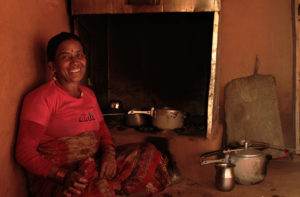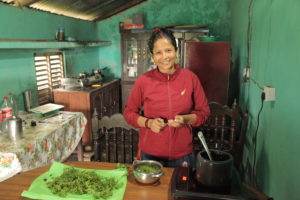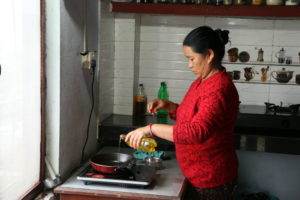More than GBP £4.5M (about USD $5.5M) in funding has been secured for a 10-year project to help thousands of households and businesses in Nepal access the benefits of clean, affordable energy for cooking.

Around 70% of Nepal’s population uses quite inefficient indoor cookstoves, often fuelled with wood, animal dung and agricultural waste. The resulting household air pollution is one of the leading risk factors for ill health and premature death in the country. Our ‘Transforming the Cookstove Market in Rural Nepal’ project, which will be implemented in Nepal’s Lumbini and Sudhurpaschim provinces, will use market forces to tackle this problem.
The project will largely focus on two elements: strengthening the supply chain of clean cookstoves, and increasing demand by making the stoves more financially attainable for households.
Pooja Sharma, Thematic Lead – Energy, says: “This project is exciting because of the sheer number of people it will help – we’re aiming for 75,000 households – but also because it’s the first of such duration. After the initial phase of getting locally made stoves out to people who need them, the project will hinge on long-term monitoring of household air pollution, how the stoves are used, and how effectively the market can be sustained.

Clean cookstove being used in a previous project
“Several factors will be key to success. For example, using our local knowledge to identify exactly the right communities to get the stoves to, and collaborating with local and federal governments to ensure no conflicting projects are going on at the same time. Also, creating that long-term incentive and capacity among local stove manufacturers on whom we’re relying, instead of importing stoves (as others have done).
“Digital technology will play an important part too. For example, households will need a QR code to put in service request to our distributors using their mobile phones.”
Mattia Vianello, Head of Energy in the UK, says: “It’s fantastic to see the impacts these projects can have on the communities – and even better when we can scale it to more households. Our current project in Nepal has shown the effectiveness of cleaner cooking. Our aspiration is that all people in Nepal will cook with clean cooking options at some point, and we are already working on building those markets in the country. Our current project with EnDev has a target of 10,000 electric cookstoves deployed by June 2023.
“Our work is showing local governments and other international institutions what solutions work, so they can be taken to greater scale so that more people can benefit and we can help bring about long-term change.”

Further use of e-cooking in action
The project is being paid for by a group of private sector investors that fund long-term carbon compensation projects. In return for financing, investors receive carbon credits, which they can use to offset some of their businesses’ emissions.
Contact Pooja for more information
